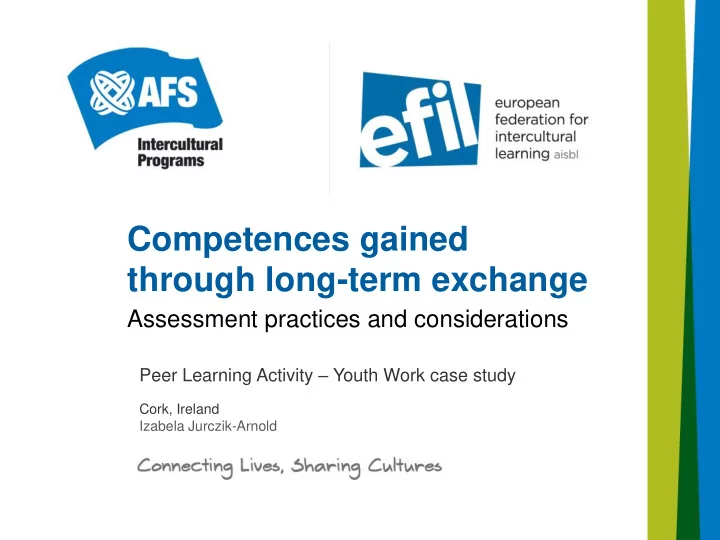

Competences gained through long-term exchange Assessment practices and considerations Peer Learning Activity – Youth Work case study Cork, Ireland Izabela Jurczik-Arnold 1
EFIL / AFS experience • Long-term immersive exchange (6-12 months) • Young people (15-18 years old) • Host family-based, attending school abroad • Careful preparation, support and follow-up through NFE seminars, individual counseling & ongoing guidance by local volunteers Combining elements of Formal Education and Informal Learning, under the Non-Formal Education framework 2
The AFS Network 3
Our Competence Framework 4
Educational Objectives Personal Interpersonal • Self-awareness • Empathy • Creative thinking • Flexibility & social skills • Critical thinking • Communication skills • Motivation & self- • Commitment to others confidence and contributing to the group • Defining self in terms of ideals & values 5
Educational Objectives Cultural Global • Building intercultural • Interest & concern in friendships world affairs, awareness of the impact of one’s • Cultural knowledge & choices on others awareness • Appreciation of global • Foreign language skills & cultural interdependence non-verbal • Commitment to communication contributing to the world • Intercultural effectiveness community 6
Research on educational outcomes • Impact of AFS Experience: Hammer Consulting, 2005 – intercultural competences & effectiveness ( DMIS), intercultural anxiety, language acquisition, knowledge of the host culture, level of intercultural interaction – 3 surveys: before, right after & 6 months after exchange, with participants, their natural families & their host families • Impact of Living Abroad: University of Essex, 2014 – acculturation, (bi-, inter-, extra-) cultural learning, intergroup processes, cultural distance – 9 online surveys for each participant, spread over 18 months 7
Educational Impact Assessment Pilot • Individual assessment over longer period • Monthly online assignments before, during & after exchange (surveys, narratives, visuals…) • Triangulation of sources: learner + volunteer + surrounding community • Focusing on 7 of the 16 Educational Objectives • Goals: – learners’ self -recognition, facilitation & documentation of the learning – organisational improvements 8 – summative group outcomes for AFS positioning
What to consider when assessing intercultural/transversal competences? • No “one best way”, rather several complementary ones • Quantitative vs. qualitative • Longitudinal (compared over time) • Formative role as (if not more) important as summative • Involvement of many actors in assessment (incl. learner) • A number of competences can only be assessed when interacting with diverse groups & situations • There are cultural differences in approaching self- & external assessment • Using assessment scales for competences involving personal values is controversial 9
Methods and approaches • Self-assessment questionnaires • Individual mentoring / coaching • Interviews • Group debriefing / group reflection • Simulations, case studies • Implicit association tests • Personal narratives (critical incidents journal, reflective journal, self- portraits, “visual speak”) • (e-)Portfolios • Official tools: IDI, IES, BEVI… 10
For consideration… • Lack of focus (of Formal Education & policy makers) on SOFT transversal competences • Soft skills are hard to quantify & require complex, multi-dimensional assessment • Results of such assessment might have issues with credibility and coherence – Does quantifying & standardising contradict NFE values? – Could NFE providers obtain e.g. “quality labels”? • There is a huge number of frameworks/scales, used by different sectors & countries 11
Recommend
More recommend